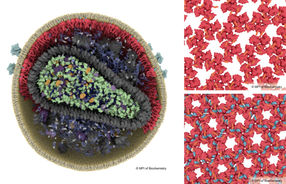Music and Genomes: Beethoven’s Genes Put to the Test
What the Exceptional Composer’s DNA Tells Us About Genetics
To what extent are exceptional human achievements influenced by genetic factors? This question, dating back to the early days of human genetics, seems to be easier to address today as modern molecular methods make it possible to analyze DNA of individuals throughout history. But how reliable are the answers in this day and age? With this in mind, an international team of researchers including the Max Planck Institutes for Empirical Aesthetics (MPIEA) in Frankfurt am Main, Germany, and for Psycholinguistics (MPI-PL) in Nijmegen, Netherlands, analyzed Ludwig van Beethoven’s DNA to investigate his genetic ‘musical’ predisposition.
The team analyzed DNA sequences available from an earlier study completed in 2023, in which the composer’s genetic material was extracted from strands of his hair. “We calculated a so-called ‘polygenic score’—an indicator for an individual’s genetic predisposition for a trait or behavior—for beat synchronization ability, which is closely related to musicality,” explains first author Laura Wesseldijk of the MPIEA. “Before running any analysis, we preregistered the study, and emphasized that we had no prior expectation about what Beethoven would score. Instead, our aim was to use this as an example of the challenges of making genetic predictions for an individual that lived over 200 years ago.”
The results were recently published in the journal Current Biology. Interestingly, Beethoven, one of the most celebrated musicians in history, had an unremarkable polygenic score for general musicality compared to population samples from the Karolinska Institute, Sweden, and Vanderbilt University, USA. However, considering the limitations of the current polygenic scores and the fact that a genetic indicator for ‘beat synchronization ability’ may not directly tap into Beethoven’s composer skills (musical creativity), this finding is not unexpected.
Senior co-author Simon Fisher of the MPI-PL explains: “Obviously, it would be wrong to conclude from Beethoven’s low polygenic score that his musical abilities were unexceptional. We think that the big mismatch between this DNA-based prediction and Beethoven’s musical genius provides a valuable teaching moment. It shows, for example, that you should be skeptical if someone claims they can use a genetic test to reliably determine whether your child will be musically gifted—or especially talented in some other area of behavior.”
The researchers stress their work does not discount that DNA contributes to people’s musical skills—prior studies found an average heritability of 42 percent for musicality. Investigating the nature of genetic contributions in large samples of people can give important insights into how and why our musical abilities and behaviors might differ, as well as help us understand the relationships between musicality and other traits, such as mental health. But using DNA data to predict the behavior of one individual remains an imprecise art, even now.
Overall, the finding that Ludwig van Beethoven, one of the most celebrated musicians in human history, had a rather low genetic predisposition for beat synchronization highlights the limitations of polygenic score predictions at the individual level. While polygenic score prediction is expected to get more accurate in the future, it is important to remember that complex human traits, including musical skills, are not determined solely by genes or the environment but rather shaped by their complex interplay.
Original publication
Most read news

Get the analytics and lab tech industry in your inbox
By submitting this form you agree that LUMITOS AG will send you the newsletter(s) selected above by email. Your data will not be passed on to third parties. Your data will be stored and processed in accordance with our data protection regulations. LUMITOS may contact you by email for the purpose of advertising or market and opinion surveys. You can revoke your consent at any time without giving reasons to LUMITOS AG, Ernst-Augustin-Str. 2, 12489 Berlin, Germany or by e-mail at revoke@lumitos.com with effect for the future. In addition, each email contains a link to unsubscribe from the corresponding newsletter.


























































